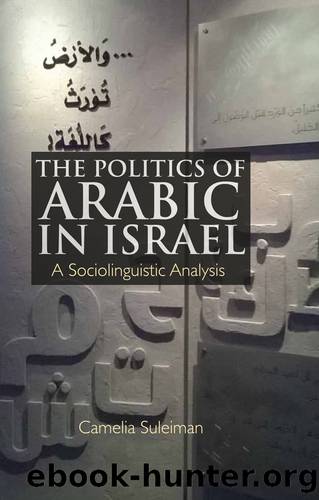The Politics of Arabic in Israel by Suleiman Camelia;

Author:Suleiman, Camelia;
Language: eng
Format: epub
Publisher: Edinburgh University Press
Published: 2017-05-09T05:06:56+00:00
Changes in the Israeli Political Scene
Yehouda Shenhav, a sociologist with Iraqi-Jewish roots at Tel-Aviv University, and an ardent supporter of Palestinian rights inside and outside of Israel proper, belongs to a cadre of Jewish intellectuals who are critical of the Israeli âincomplete democracyâ and the ethno-religious nature of it. Jews of Arab origin belong generally to the poorer strata of society and live in the geographic periphery of Israel, away from Tel-Aviv and its surrounding urban and subÂurban centres. They are generally discriminated against in education, employment, social mobility and places of residence, even though they constitute the majority of Jewish society. However, they were not part of the nation-building ethos early in the twentieth century and were not brought into Israel until the 1950s. The melting pot of the state aimed at âde-Arabisingâ them from their Arab identity. Many Orientalist stereotypes were applied to them and they were considered backward and primitive societies in need of modernisation (see Shenhav 2006, Chetrit 2013). Many of them have turned to the right-wing Likud party since the 1970s, which has expressed a more militant stance towards the Palestinians. The Likud party also opened the country for neo-liberalism, economically speaking. So the question is: how is it that the strata who are discriminated against still follow right-wing parties such as the Likud and some of its allies, for example, Shas, the religious party representing Mizrachi Jews? The answer to this seeming contradiction is to be found in Uri Ramâs analysis of Israelâs neo-liberal age (Ram 2008). On the one hand, economic liberalisation brought about a process of globalisation, mainly in Tel-Aviv. The affluent class who benefited from the neo-liberal policies became more open to a resolution with the Palestinians, as well as to integrating them fully in the Israeli economic order. The outlook of this class is towards the global economic order and the place of Israel in it. Naturally, globalisation in Israel (as in many other places) meant Americanisation. Israelis look to the US as a cultural and economic model, and appreciate US support (First and Avraham 2009). On the other hand, the neo-liberalism entailed an inclusionary/exclusionary rhetoric which redrew the boundaries of the nation in Israel excluding the Mizrachi Jews from the economy, but at the same time including them as part of the nation, in such a way that the Labour party, with its contempt and disdain for the Arab Jews, was not able to get their support at any moment of its domination of Israeli politics. In other words, the nationalistic stance of the Likud was able to include the Mizrachi Jews as part of the nation. Shas has become an important partner in Likud governments and uses a combination of religious and nationalistic rhetoric which appeals to the Mizrachi masses. Add to this mixture Israelâs move towards populism, and the charismatic personality of Benyamin Netanyahu, the Likud leader who has won three elections in a row since 2009. Netanyahu and his government play to the racist fears of the Jewish masses (see Filc 2010).
Download
This site does not store any files on its server. We only index and link to content provided by other sites. Please contact the content providers to delete copyright contents if any and email us, we'll remove relevant links or contents immediately.
The European Opportunity by Felipe Fernández-Armesto(585)
The European History Highway: A Guide to Internet Resources by Dennis A. Trinkle Scott A. Merriman(543)
The Seven Wonders of the Ancient World by Michael Denis Higgins(530)
Morgan Kaufmann Digital Watermarking and Steganography by Ingemar Cox Matthew Miller Jeffrey Bloom Jessica Fridrich Ton(530)
European Security without the Soviet Union by Stuart Croft Phil Williams(513)
Hyperculture by Byung-Chul Han(512)
The Routledge companion to Christian ethics by D. Stephen Long Rebekah L. Miles(510)
European Security in a Global Context by Thierry Tardy(507)
Get Real with Storytime by Julie Dietzel-Glair & Marianne Crandall Follis(445)
Hudud Al-'Alam 'The Regions of the World' - a Persian Geography 372 A.H. (982 AD) by V. V. Minorsky & C. E. Bosworth(440)
Tibetan Studies in Comparative Perspective by Chih-yu Shih Yu-Wen Chen(437)
Gorbachev And His Generals by William C. Green(430)
Governance, Growth and Global Leadership by Espen Moe(428)
CliffsNotes on Fitzgerald's The Great Gatsby by Kate Maurer(415)
How Languages Are Learned 5th Edition by Patsy M Lightbown;Nina Spada; & Nina Spada(410)
The Egyptian Economy, 1952-2000 by Khalid Ikram(389)
The Oxford History of the World by Fernández-Armesto Felipe;(388)
The Oxford Handbook of the Incas by Sonia Alconini(374)
Oral Poetry and Narratives from Central Arabia: The Poetry of Ad-Dindan : A Bedouin Bard in Southern Najd (Studies in Arabic Literature, Vol 17) (English and Arabic Edition) by P. M. Kupershoek P. Marcel Kurpershoek(368)
